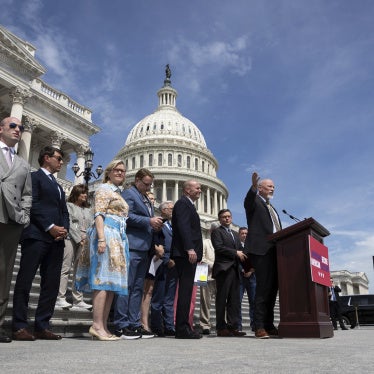TASHKENT, Uzbekistan -- As the assault on Osama bin Laden and his Taliban protectors in Afghanistan continues into its second week, Uzbekistan, Afghanistan's neighbor to the north, is emerging as one of the most stalwart regional supporters of the U.S.-led military campaign. While other states in the region remained equivocal and noncommittal, Uzbekistan welcomed an early October visit from U.S. Secretary of Defense Donald Rumsfeld and announced that the U.S. could use its air space and several of its airfields. More than 1,000 U.S. troops are already stationed in Uzbekistan and last Friday the two countries announced the formation of a "qualitatively new relationship."
Uzbekistan's enthusiasm for the antiterror campaign should be no mystery. It's an opportunity to reinforce its independence from Russia and enlist the U.S. in battle against its own Islamic insurgency -- the Islamic Movement of Uzbekistan, which is based in Afghanistan. What the U.S. gets is more ambiguous. In the short run, it will benefit from the use of Uzbek bases. But if it becomes too closely affiliated with Uzbekistan's corrupt and abusive government, the unintended consequences could haunt the U.S. after its immediate goals in Afghanistan are met.
The Bush administration has repeatedly said that the antiterrorism effort would be multifaceted, emphasizing effective diplomacy as much or more than the military efforts. The U.S. needs to be asking Uzbek President Islam Karimov not just for a landing strip, but also for a dramatic turnaround in his own domestic policies. Otherwise, by continuing to impoverish and alienate its own people, Mr. Karimov's government may contribute more to the problem of instability and violence in Central Asia than to the solution.
Mr. Karimov is a holdover from the Soviet times and his political and economic performance bears the stamp of that era. On the economic front, 10 years of independence have brought the Uzbek people crippling poverty. The pace of economic reform is so slow that the IMF gave up and removed its representative in March. In its most recent country strategy for Uzbekistan, the European Bank for Reconstruction and Development concluded that it could justify only limited future investments in the country.
In politics Mr. Karimov similarly resists reform and rules with an iron fist. The government recognizes no political parties other than those aligned with the president, and organized political opposition is not tolerated. The state exercises tight control over the media, including through pre-publication censorship. There are no independent news outlets. Journalists critical of the government are routinely threatened by state authorities and have been driven out of the country under threat of arrest.
There is no freedom of assembly: Police violently disband any attempts at public demonstrations and arrest the participants. Torture is rampant, with police and agents of the National Security Service (the successor to the Uzbek KGB) regularly hanging criminal suspects and political detainees by their feet or wrists, beating them with batons or bottles filled with water, applying electroshock to their bodies, and raping or threatening to rape them. Police torture has resulted in at least 15 deaths in custody in the past two years alone.
Since 1997, those most brutally victimized have been Muslims who practice their faith outside of government control, their families, and their defenders. Local human-rights activists estimate that 7,000 independent Muslims are currently serving terms in Uzbekistan's prisons. Charged with "anti-state activity" for studying the Koran, following a disfavored imam, or possessing religious literature not sanctioned by the state, these men face prison sentences up to 20 years.
As the Bush administration has acknowledged, the key challenge facing the collation is to fight terrorism without being seen as fighting the peaceful expression of Islam. Uzbekistan's policies, which make no such distinction, undermine that goal.
Thus Uzbekistan's most important contribution to the global antiterror effort might be to clean up its own act: create the legal, political, and social space for the peaceful expression of alternative views; implement electoral reform along the lines suggested by the Organization for Security and Cooperation in Europe; make meaningful progress toward freedom of association, including the registration of local human-rights organizations and other civil society groups; repeal the repressive religion law and cease arbitrary arrest and detention of peaceful religious believers; release those unlawfully imprisoned; and allow the development of free and independent media. An antiterror coalition that aims to defend democracy, human rights, and the values that came under attack on September 11, can expect no less of the nations that seek to join.
Meeting in Tashkent recently, U.S. Defense Secretary Donald Rumsfeld and Mr. Karimov assured reporters that there was no quid pro quo for America's use of Uzbekistani territory. Certainly no favors need be bestowed on Uzbekistan, which benefits handsomely from the partnership. But if the U.S. and its allies are looking beyond the immediate military campaign to the long-term stability of the region and its likely impact on their antiterrorism efforts, they should be demanding more of the Karimov government in return.







